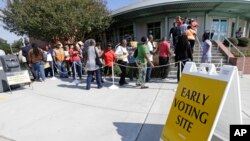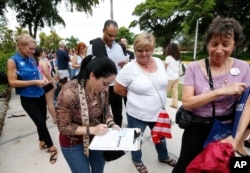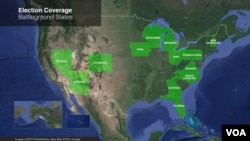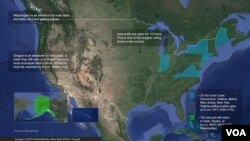As Americans go to the polls in Tuesday's presidential election, those who want to know the winner really only need to pay attention to the results in about a dozen U.S. states.
They are the so-called swing states or battleground states, the ones where the outcome is at least somewhat in doubt and where candidates spend a much bigger portion of their time and campaign dollars.
The situation exists for a few reasons.
State-by-state contests
First, instead of a straight popular vote, the U.S. system relies on state-by-state contests with candidates trying to earn a majority of electoral votes. The more people who live in a state, the more electoral votes go to the victor.
Second, demographics and political leanings only change so much between elections. The U.S. votes for president every four years, and in between, the voter makeup in each state stays relatively the same, because only a certain number of people come of voting age, die or move in or out of the state.
The result is that Democrat Hillary Clinton and Republican Donald Trump did not have to bother campaigning much in places like New York, Hawaii, Wyoming or Alabama. The last time a Republican won those first two was in 1984, and the last Democratic wins in the others happened in 1964.
“It makes those 12 states really the targets of this whole election discourse,” George Mason University expert Jeremy Mayer told VOA. “So both campaigns in a normal year would have massive ground operations, would have endless TV ads and would be phone calling and robot calling voters in those 12 states.”
The states to watch in this year’s presidential race are spread across the country:
* Florida
* Ohio
* Colorado
* Pennsylvania
* Nevada
* Virginia
* Michigan
* North Carolina
* Iowa
* Arizona
* Wisconsin
* New Hampshire
* Georgia
Republican Mitt Romney won Arizona, Georgia and North Carolina in 2012. President Barack Obama, a Democrat, won the rest.
Florida and Ohio, with their large numbers of electoral votes, are the two swing states that seem to feature in every election. Going back to the 1976 vote, a Republican has won Florida six times and a Democrat four times. In Ohio, the split is even at five-to-five.
Colorado has gone to a Republican seven times during that span, but in a sign of shifting demographics, Obama won the state in both 2008 and 2012.
Obama broke an even longer streak to win twice in Virginia, which like many states, even the ones that are solidly Republican or Democrat, has distinct areas that tend to lean toward one party or the other.
In Virginia, the suburbs just outside Washington, D.C., and the areas around the state capital, Richmond, and the southeastern Newport News area went for Obama while many of the rural counties backed Romney in 2012. Florida had a similar breakdown with Obama winning around Miami, Tampa, Orlando and state capital, Tallahassee.
Divided states, late results
Just how divided the states are in this election will determine when media outlets are able to project either Trump or Clinton the winner.
In 2004, an extremely close race in Ohio left two networks calling the state for President George W. Bush just before 1 a.m. on the morning after Election Day and putting him just one electoral vote from clinching another term. Others waited until later in the day to be sure.
In 2000, it was Florida that held up Bush’s first election to the presidency. His opponent, Democrat Al Gore, challenged the initial results, setting off a legal battle that ended with a U.S. Supreme Court decision more than a month after voters cast their ballots.
Jim Malone and Katherine Gypson contributed to this report.







